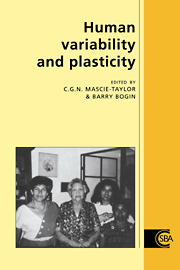Book contents
- Frontmatter
- Contents
- List of contributors
- Foreword
- 1 The pervasiveness of plasticity
- 2 Plasticity in early development
- 3 Plasticity in the growth of Mayan refugee children living in the United States
- 4 The place of plasticity in the study of the secular trend for male stature: an analysis of Danish biological population history
- 5 Plasticity, growth and energy balance
- 6 The study of migrants as a strategy for understanding human biological plasticity
- 7 Human migration: effects on people, effects on populations
- 8 The use of surnames in the study of human variation and plasticity
- 9 A biological anthropological approach to measuring societal stress of parasitic disease: a case study of schistosomiasis
- 10 Biological adaptability, plasticity and disease: patterns in modernizing societies
- 11 Human biological adaptability with special emphasis on plasticity: history, development and problems for future research
- Index
9 - A biological anthropological approach to measuring societal stress of parasitic disease: a case study of schistosomiasis
Published online by Cambridge University Press: 28 October 2009
- Frontmatter
- Contents
- List of contributors
- Foreword
- 1 The pervasiveness of plasticity
- 2 Plasticity in early development
- 3 Plasticity in the growth of Mayan refugee children living in the United States
- 4 The place of plasticity in the study of the secular trend for male stature: an analysis of Danish biological population history
- 5 Plasticity, growth and energy balance
- 6 The study of migrants as a strategy for understanding human biological plasticity
- 7 Human migration: effects on people, effects on populations
- 8 The use of surnames in the study of human variation and plasticity
- 9 A biological anthropological approach to measuring societal stress of parasitic disease: a case study of schistosomiasis
- 10 Biological adaptability, plasticity and disease: patterns in modernizing societies
- 11 Human biological adaptability with special emphasis on plasticity: history, development and problems for future research
- Index
Summary
Summary
Although Lasker's concept of plasticity is generally thought of in terms of growth, this chapter extends his approach to the study of the impact of infection with schistosomes. The chapter questions whether the World Health Organization is justified in suggesting that schistosomiasis is second only to malaria in socioeconomic and public health importance: schistosomiasis is not responsible for high mortality and its effects on work capacity and productivity, nutrition, and growth of children are not clear-cut.
Introduction
The extent to which humans show plasticity in response to stress (Lasker, 1969) is frequently discussed by biological anthropologists in relation to growth. This chapter focuses on the impact of disease, and in particular of one parasitic disease, schistosomiasis, and examines whether humans show plasticity in their response to disease.
Disease is generally thought of as an impairment of health and well-being whereby an individual falls below optimal functioning. In practice ‘optimal’ is not easy to define; good health status relies on a relatively subjective evaluation of the overall functional status of an individual within the limits set by the society within which s/he lives.
When discussing disease, three classes of contributory factors are usually recognized: the agent, the human host and the environment. The agent is the animate or inanimate proximal cause, essential for the disease to occur. Agents can be classified as nutritional elements, chemical agents, physiological, physical, genetic and psychic factors, and invading living organisms. Invading organisms belonging to the animal kingdom are generally called parasites; other organisms include bacteria and viruses. The host factors include both biological and behavioural ones which relate to susceptibility or resistance.
- Type
- Chapter
- Information
- Human Variability and Plasticity , pp. 159 - 189Publisher: Cambridge University PressPrint publication year: 1995
- 1
- Cited by



